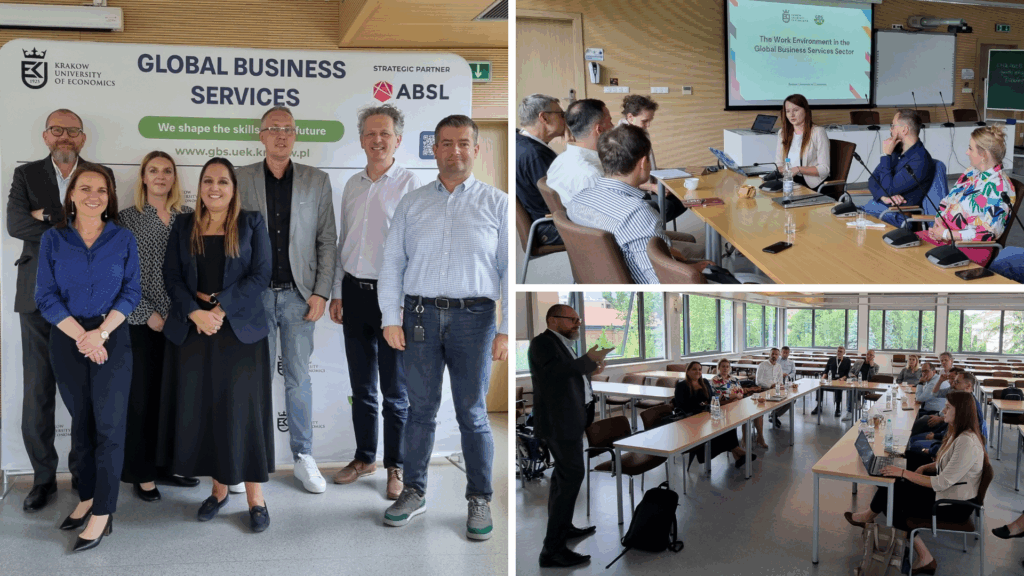[English version below]
11 czerwca odbyło się posiedzenie Rady Interesariuszy kierunku Global Business Services, podczas którego poruszyliśmy trzy kluczowe tematy: wyniki badania wśród studentów, przyszłość sektora GBS oraz badanie dotyczące środowiska pracy w branży.
Wyniki badania wśród studentów
Zwróciliśmy uwagę na potrzebę przemyślenia obecnego systemu oceniania zajęć. Zaproponowano, aby oceny były zbierane po każdej jednostce zajęć, a nie jedynie podsumowująco na koniec semestru. Ponadto wskazano, że ocena powinna obejmować wszystkich studentów, a nie tylko osoby z pierwszego roku.
Ponadto przedstawiona została opinia Parlamentu Studentów zgodnie z którą niektóre przedmioty kierunku nie są dla studentów w pełni zrozumiałe, co wymaga dalszej analizy i ewentualnych działań korygujących.
Na koniec zaproponowano zorganizowanie warsztatów we współpracy z Kołem Naukowym GBS, aby lepiej poznać ich punkt widzenia oraz sugestie dotyczące kierunku studiów.
Przyszłość sektora GBS i kierunku GBS
Zaprezentowane zostały zmiany wprowadzone na kierunku GBS wynikające ze zmian formalnych na całej uczelni. Uczestnicy podkreślali ogromne znaczenie zajęć praktycznych i tych prowadzonych w języku angielskim.
W trakcie dyskusji zaproponowano przygotowanie studentom nagrań od firm partnerskich, które pozwolą im lepiej zrozumieć obecne wyzwania rynkowe, w tym kwestie związane z perspektywą zmian w sektorze.
Badanie dotyczące środowiska pracy w GBS
Kolejnym punktem posiedzenia było badanie dotyczące środowiska pracy w sektorze Global Business Services. Badanie obejmowało kilka istotnych obszarów, takich jak utożsamianie się pracowników z organizacją oraz ich postawy środowiskowe. Analizowano również poziom zaangażowania na rzecz zespołu, a także możliwości rozwoju i wyrażania siebie przez pracowników. Ważnym elementem badania była swoboda wyrażania myśli oraz oczekiwania dotyczące tego, jak środowisko pracy powinno wyglądać w przyszłości. Wyniki badania dostarczyły cennych informacji, które posłużą jako podstawa do dalszych rozmów i działań.
Osoby obecne podczas RAdy:
- ABB: Michal Sokolowski, Paweł Wużyk
- Abbvie: Krzysztof Glomb
- Accenture: Jessica Rodriguez
- Cisco: Jaroslaw Dudoń
- Hitachi Energy: Pawel Suliński
- Jacobs: Bernadetta Cisowska
- Kimberly Clark: Paweł Motyl
- Shell: Piotr Laszczak
- TE Connectivity: Tomasz Sawa
- Zurich: Iwona Macieik
- UEK: prof. Marek Ćwiklicki, dr Wioleta Gałat, dr Kamila Pilch, dr Agnieszka Pacut, Dorota Bentke
Raporty z badań sektora GBS:
Prognoza rozwoju sektora firm GBS w świetle zmian technologicznych

Summary of the Global Business Services Stakeholder Council meeting
On June 11, a meeting of the Global Business Services Stakeholder Council was held, where we discussed three topics: the results of a student survey, the future of the GBS sector, and a study on the working environment in the industry.
Results of the student survey
Furthermore, the Student Parliament expressed the opinion that some of the subjects in the program are not fully understandable to students, which requires further analysis and possible revision.
Finally, it was proposed to organize workshops in cooperation with the GBS Scientific Club to better understand their point of view and suggestions regarding the study program.
The future of the GBS sector and the GBS programme
Changes introduced to the GBS programme resulting from formal changes across the university were presented. Participants emphasised the great importance of practical classes and those conducted in English.
During the discussion, it was proposed to prepare recordings from partner companies for students to help them better understand current market challenges, including issues related to the prospect of changes in the sector.
Survey on the working environment in GBS
The next point on the agenda was a study on the working environment in the Global Business Services sector. The study covered several important areas, such as employee identification with the organization and their attitudes toward the environment. The level of commitment to the team was also analyzed, as well as opportunities for development and self-expression for employees. An important element of the study was the freedom to express thoughts and expectations about what the working environment should look like in the future. The results of the study provided valuable information that will serve as a basis for further discussions and actions.